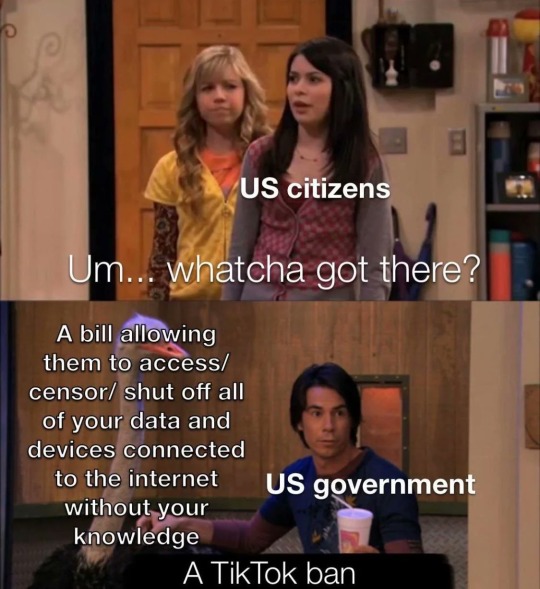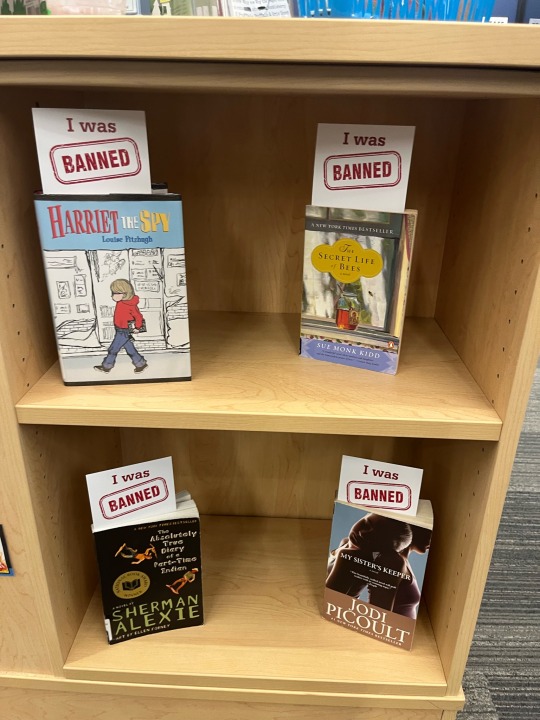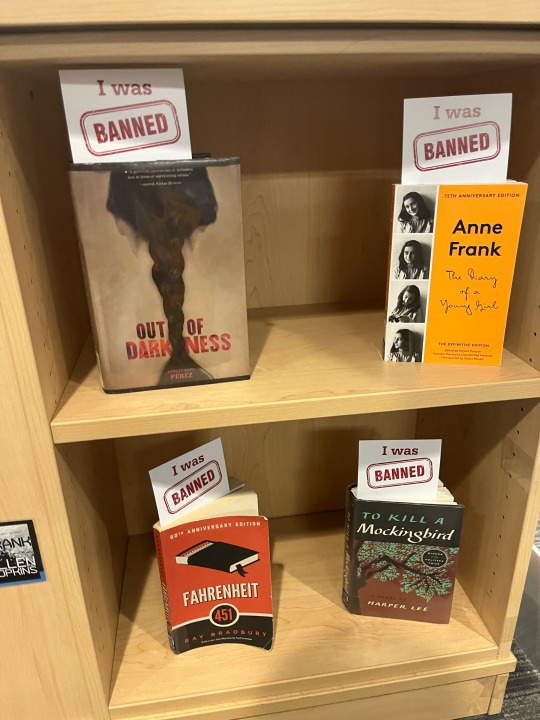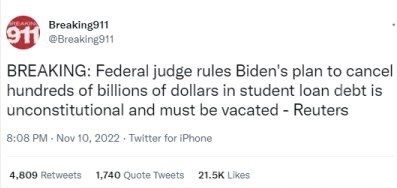#Unconstitutional
Text

89K notes
·
View notes
Text
💥 NCSWIC 💥
There are a lot of pending indictments 🤔
#pay attention#educate yourselves#educate yourself#knowledge is power#reeducate yourself#reeducate yourselves#think about it#think for yourselves#think for yourself#do your homework#news#nevada#american news#surprise#you decide#criminal#treason#unconstitutional
564 notes
·
View notes
Text
Imagine the chaos if individual states enacted cruel laws like this.
#republican assholes#Greg Abbott is a murderer#Greg Abbott is a human trafficker#Texas Republicans are the worst#republican family values#maga morons#southern border#unconstitutional#traitor trump#crooked donald#republican hypocrisy#traitor#republican values#resist
208 notes
·
View notes
Text
Republicans love the Constitution almost as much as they love violating it to persecute people.
#vote democrat#democracy#democrats#vote biden#vote blue#vote blue to save democracy#democrats now socialism later#democratic socialism#social democracy#blue wave#lgbtq rights#unconstitutional#fuck the gop#fuck trump
95 notes
·
View notes
Text
For everybody that follows me that lives in the United States, contact your local state representatives about the KOSA bill and how it is unconstitutional, it is a privacy violation and it is an overreach of government power. The government should not have this much power, we are not North Korea, we are in the free country of the United States of America. And the fact that our rights are constantly taken from us every day is a problem. Contact your local state representatives, get angry they already don’t listen to us but maybe they’ll listen to what if we contact them en mass 
#stop kosa#kosa bill#fuck kosa#kosa act#kosa#data privacy#online privacy#privacy violations#privacy violation#unconstitutional
56 notes
·
View notes
Text
Chisel. Chisel — First Amendment v American Fascism
[The Supreme] Court’s decision to leave the Fifth Circuit’s attack on the First Amendment in place could be temporary. As Sotomayor writes in her Mckesson opinion, when the Court announces that it will not hear a particular case it “expresses no view about the merits.” The Court could still restore the First Amendment right to protest in Louisiana, Mississippi, and Texas in a future case.
For the time being, however, the Fifth Circuit’s Mckesson decision remains good law in those three states. And that means that anyone who organizes a political protest within the Fifth Circuit risks catastrophic financial liability.
#black lives matter#racism#first amendment#right of assembly#capitalism#protest#activism#unconstitutional#fascism#lousiana#mississippi#texas#usa#us politics#supreme court#2024
50 notes
·
View notes
Text
Watch "Chief Gabe on Gopro Max; Turtle Lake, Wisconsin" on YouTube
youtube
Fucking sick. Leave people alone. They ain't interacting with you don't fucking bother them. There isn't anything wrong with so called "loitering" in the basic sense of the word. Man just needs a place to rest and use the libraries. Has nobody seen Rambo.?? Lucky Travis is a nice guy. Continues asking for ID like some kind of fiend. Especially after he CLEARLY got all the information he needed from his fucking license plate. Clearly it's his car he's got his whole life in that thing. Fuck pigs. Still asking for ID WHILE CALLING HIM BY HIS NAME.
Man gets harrased where he goes, doesn't approach cops to rile them up or nothing they just swarm to him like flies. Eat shit like the little bug you are PIG.
434 notes
·
View notes
Text

Enough said.
#abortion#abortion rights#choose choice#it’s a woman’s right to choose#roe vs. wade#female empowerment#the future is female#pregnancy#health#healthy living#supreme court#justice#human rights#humanity#empathy#her body her choice#bans off my body#constitutional#unconstitutional#pro choice#enough said#just stfu#privacy#private#personal#personal choice#mind your own buisness#mind your own damn business#straight talk#say it like you mean it
409 notes
·
View notes
Text

Montana can ban TikTok, but it
probably can’t enforce it
Tech experts said the first-in-the-nation law is ‘technically incompetent’ and would require more data-gathering by companies,not less.
“On Wednesday, five TikTok creators filed a lawsuit claiming the ban infringes on their First Amendment rights and those of hundreds of thousands of TikTok users in Montana. The suit, which names Montana Attorney General Austin Knudsen as defendant, says the state ‘can no more ban its residents from viewing or posting to TikTok than it could ban the Wall Street Journal because of who owns it or the ideas it publishes.’”
“Some free-speech experts expect any TikTok challenge would prevail on First Amendment grounds. In 2020, federal judges blocked President Donald Trump’s executive order banning TikTok and the Chinese app WeChat, saying the government had provided “scant little evidence’ to justify a ban that would “burden substantially more speech than is necessary.’”
“’You can’t enforce this ban without creating a surveillance state that includes fine-grained location data and the ability to monitor and read people’s phones — the exact mirror of the Chinese surveillance state they’re afraid of to begin with,’ Red Queen Dynamics’s Wheeler said.”
#tiktok#montana#censorship#tiktok ban#social media#laws#unconstitutional#politics#lawsuit#privacy#surveillance state#surveillance
52 notes
·
View notes
Text
Agenda 47
Agenda 47 would turn America into an unconstitutional authoritarian police state with the President as dictator. It would effectively shred the United States Constitution into pieces.
1: Make homelessness and Urban Camping illegal. Violators would be rounded up by Government agents, charged with a crime, and put into FEMA camps away from society. Effectively killing the 8th amendment of the United States Constitution.
2: Death penalty for Human traffickers and drug dealers. This would operate the same way China operates for these crimes. Anyone accused and arrested for these crimes would have a swift trial and if convicted be swiftly executed. Effectively adopting the justice system of a Communist Dictatorship.
3: Using Executive Orders on day one to end natural born citizenship in America. Effectively killing the 14th amendment of the United States Constitution.
4: Implement an unconstitutional Nationwide "Stop and Frisk" policy and deployment of federal assets, including the National Guard, if local law enforcement refuses to comply with this order. Effectively violating the Posse Comitatus Act of 1878 and killing the 4th amendment of the United States Constitution.
5: Strictly enforcing existing gun laws and implement nation wide "Red Flag" gun laws that violate the 2nd amendment of the United States Constitution.
This is Trumps Agenda 47. This is the future the Right-Wing wants for America. This agenda is not hidden, its displayed proudly on Donald Trumps own website for everyone to see. This is the future your children will live in if you don't take a stand against this and fight for our rights, fight for the Constitution, fight for the freedom of future generations.
#donald trump#trump#unconstitutional#freedom violation#police state#dictatorship#authoritarianism#authoritarian state#agenda 47#trump 2024#fuck trump
27 notes
·
View notes
Text
Hey there! Would you be interested in becoming absolutely enraged? Here are books that are banned!:





In case you can’t see:
Harriet The Spy
The Secret Life Of Bees
The Absolutely True Diary Of A Part Time Indian
My Sisters Keeper
The Lorax
Charlottes Web
Speak
The Kite Ruiner
The Book Theory
The Handmaid’s Tale
The Poisionwood Bible
Me, Earl, And The Dying Girl
The Great Gabtsy
Out Of Darkness
The Diary of Anne Frank
Fahrenheit 451
To Kill A Mocking Bird.
I cannot stress this enough, this makes me physically ill. Charlottes Web? The Lorax? It’s insane. Anne Frank, Handmaid’s Tale, The Giver (not listed but banned), and Fahrenheit 451 are all cautionary tales, it’s not surprising that they’re banned. The books warn up about what’s happening. And we cannot read them, so we cannot be warned. Liberty dies where books are banned.
#america#banned books#unban books#liberty dies where books are banned#unconstitutional#what about free speak?#freedom of the press?#does this not exist?#how is this legal?
18 notes
·
View notes
Text
Paying taxes is unconstitutional... The End!
After hearing that 👆 video then you need to listen to this 👇 video again.
Think about doing some research. 🤔
#pay attention#educate yourselves#educate yourself#knowledge is power#reeducate yourself#reeducate yourselves#think about it#think for yourselves#think for yourself#do your homework#do some research#do your own research#ask yourself questions#question everything#taxes#unconstitutional#government corruption#government overreach#crimes against humanity#history lesson#american history#world history
384 notes
·
View notes
Text
Russia owns Republican traitors.
#republican assholes#Tex-ass Republicans#traitor#Murderer Greg Abbott#southern border#immigration#migrants#Unconstitutional#racist republicans#xenophobic republicans
48 notes
·
View notes
Text


69 notes
·
View notes
Text
“Mr. Garland’s memo did acknowledge that “spirited debate about policy matters is protected under our Constitution.” That is true but doesn’t go nearly far enough. Education is mostly speech, and parents have a constitutional right to choose the speech with which their children will be educated. They therefore cannot constitutionally be compelled, or even pressured, to make their children a captive audience for government indoctrination.
Public education in America has always attempted to homogenize and mold the identity of children. Since its largely nativist beginnings around 1840, public education has been valued for corralling most of the poor and middle class into institutions where their religious and ethnic differences could be ironed out in pursuit of common “American” values.
The goal was not merely a shared civic culture. Well into the 20th century, much of the political support for public schooling was driven by a fear of Catholicism and an ambition to Protestantize Catholic children. Many Catholics and other minorities escaped the indoctrination of their children by sending them to private schools.
Nativists found that intolerable. Beginning around 1920, they organized to force Catholic children into public education. The success of such a measure in Oregon (with Democratic votes and Ku Klux Klan leadership) prompted the Supreme Court to hold compulsory public education unconstitutional.
The case, Pierce v. Society of Sisters (1925), was brought by a religious school, not a parent. The justices therefore framed their ruling around the threat to the school’s economic rights. But Pierce says that parents can educate their children outside state schools in accord with the parents’ moral and religious views.
Although the exact nature of this parental freedom is much disputed, it is grounded in the First Amendment. When religious parents claim the freedom, religious liberty seems an especially strong foundation. But the freedom of parents in educating their children belongs to all parents, not only the faithful. Freedom of speech more completely explains this educational liberty.
(…)
The public school system, by design, pressures parents to substitute government educational speech for their own. Public education is a benefit tied to an unconstitutional condition. Parents get subsidized education on the condition that they accept government educational speech in lieu of home or private schooling.
(…)
To be sure, Pierce doesn’t guarantee private education. It merely acknowledges the right of parents to provide it with their own resources. And one may protest that economic pressure is not force. But the Supreme Court has often ruled otherwise.
(…)
When government makes education compulsory and offers it free of charge, it crowds out parental freedom in educational speech. The poorer the parents, the more profound the pressure—and that is by design. Nativists intended to pressure poor and middle-class parents into substituting government educational speech for their own, and their unconstitutional project largely succeeded.
Most parents can’t afford to turn down public schooling. They therefore can’t adopt speech expressive of their own views in educating their children, whether by paying for a private school or dropping out of work to home-school. So they are constrained to adopt government educational speech in place of their own, in violation of the First Amendment.
A long line of Establishment Clause decisions recognize the risk of coercion in public-school messages. In Grand Rapids School District v. Ball (1985), the high court condemned private religious teaching in rooms leased from public schools. “Such indoctrination, if permitted to occur, would have devastating effects on the right of each individual voluntarily to determine what to believe (and what not to believe) free of any coercive pressures from the State,” Justice William Brennan wrote for the majority.
Coercion seemed central in such cases because of the vulnerability of children to indoctrination. Summarizing the court’s jurisprudence, Justice Sandra Day O’Connor, concurring in Wallace v. Jaffree (1985), observed that “when government-sponsored religious exercises are directed at impressionable children who are required to attend school, . . . government endorsement is much more likely to result in coerced religious beliefs.”
(…)
Rights are “exceptions” to power, James Madison observed. That is, rights defeat power. But contemporary judicial doctrine allows power to defeat rights—at least when government asserts what is called a compelling interest. One might think that a state’s compelling interest in public education overpowers any parental speech right. Yet because such analysis allows power to subdue rights, it is important to evaluate whether the claimed government interest is really compelling.
The U.S. was founded in an era when almost all schooling was private and religious, and that already suggests that any government interest in public education is neither necessary nor compelling. Further, the idea that public education is a central government interest was popularized by anti-Catholic nativists. Beginning in the mid-19th century, they elevated the public school as a key American institution in their campaign against Catholicism.
In their vision, public schools were essential for inculcating American principles so that children could become independent-minded citizens and thinking voters. The education reformer and politician Horace Mann said that without public schools, American politics would bend toward “those whom ignorance and imbecility have prepared to become slaves.”
That sounds wholesome in the abstract. In practice, it meant that Catholics were mentally enslaved to their priests, and public education was necessary to get to the next generation, imbuing them with Protestant-style ideas so that when they reached adulthood, they would vote more like Protestants.
(…)
The inevitably homogenizing, even indoctrinating, effect of public schools confirms the danger of finding a compelling government interest in them. A 1904 nativist tract grimly declared that the public school is “a great paper mill, into which are cast rags of all kinds and colors, but which lose their special identity and come out white paper, having a common identity. So we want the children of the state, of whatever nationality, color or religion, to pass through this great moral, intellectual and patriotic mill, or transforming process.”
The idea of a common civic culture among children is appealing when it develops voluntarily, but not when state-approved identities and messages are “stamped upon their minds,” as the 1904 tract put it. Far from being a compelling government interest, the project of pressing children into a majority or government mold is a path toward tyranny.
The shared civic culture of 18th-century America was highly civilized, and it developed entirely in private schools. The schools, like the parents who supported them, were diverse in curriculum and their religious outlook, including every shade of Protestantism, plus Judaism, Catholicism, deism and religious indifference.
In their freedom, the 18th-century schools established a common culture. In contrast, public-school coercion has always stimulated division. It was long used to grind down the papalism of Catholic children into something more like Protestantism. Since then, there has been a shift in the beliefs that public schools seek to eradicate. But the schools remain a means by which some Americans force their beliefs on others. That’s why they are still a source of discord. The temptation to indoctrinate the children of others—to impose a common culture by coercion—is an obstacle to working out a genuine common culture.
There is no excuse for maintaining the nativist fiction that public schools are the glue that hold the nation together. They have become the focal point for all that is tearing the nation apart. However good some public schools may be, the system as a whole, being coercive, is a threat to our ability to find common ground. That is the opposite of a compelling government interest.
The public school system therefore is unconstitutional, at least as applied to parents who are pressured to abandon their own educational speech choices and instead adopt the government’s.
Parents should begin by asking judges to recognize—at least in declaratory judgments—that the current system is profoundly unconstitutional. Once that is clear, states will be obliged to figure out solutions. Some may choose to offer tax exemptions for dissenting parents; others may provide vouchers. Either way, states cannot deprive parents of their right to educational speech by pushing children into government schools.”
#education#public education#public schools#private schools#compulsory education#first amendment#freedom of speech#libertarian#libertarianism#catholocism#anticlericalism#constitution#unconstitutional
7 notes
·
View notes
Text
3 notes
·
View notes